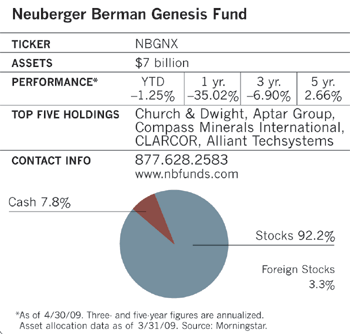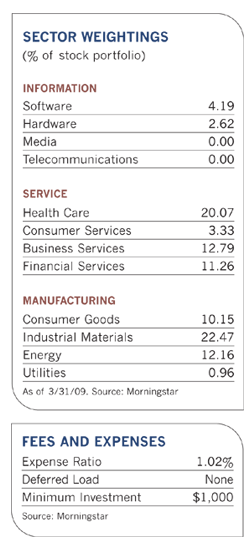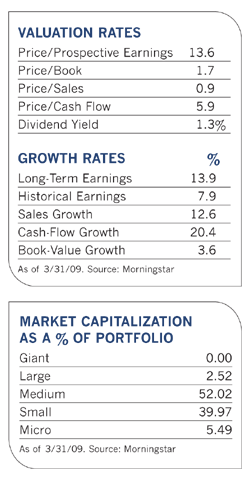"Property/casualty companies have their own unique cycles where pricing power drops for three to five years, then rises over a similar time frame," he explains. "Right now, they are moving toward the end of a down pricing cycle." After several major natural disasters, many insurers are short on capital and will need to raise premiums. One of Genesis' holdings, Validus Holdings, is a reinsurance company that provides capital for insurers short on cash. Because it was formed after Hurricane Katrina, its coffers have not been drained by natural disasters and it is in a position to provide capital to insurers that need it.
However, he remains extremely cautious about the financial sector and the economy in general. "Although the government has intervened to support the financial sector, considerable risk remains," he says. "Consumer balance sheets are stretched and the deleveraging process will take several years." On the other hand, he is more optimistic that the multiyear rebuilding of transportation, water and energy infrastructure both here and abroad will increase demand for industrial materials and commodities.
He also has a greater weight in energy stocks than the Russell 2000 benchmark. Although commodity prices and energy stocks have corrected sharply since mid-2008, D'Alelio believes the steep run-up in the first half of 2008 foreshadows further increases once the global economy stabilizes. "Energy producers have announced major reductions in capital spending that will dramatically reduce oil and natural gas supplies," he says. "At the same time, the per capita consumption of oil in China is 10% of what it is in the U.S. Even though demand is off now, supply-demand forces are going to push prices up over time." He believes that OPEC's efforts to decrease supply through coordinated voluntary cuts in production will be successful in bringing balance to the global oil market in the next year and set the stage for higher prices.
His current strategy reflects two dominant themes: He's avoiding overleveraged consumer plays and focusing on the beneficiaries of emerging market demand.
As part of the first theme, the fund has underweighted economically sensitive areas such as financial services and consumer discretionary for several years. Instead, the focus is on companies that can grow their businesses without a favorable tailwind, especially those involved in health care, consumer staples and defense.
In the health care sector, he avoids pharmaceuticals and HMOs in favor of veterinary and dental care companies. Idexx Laboratories, a maker of testing and diagnostic equipment for veterinary clinics, has benefited from the rising spending on veterinary care over the last few years and has a 30% to 50% market share in some areas of the country. Because pet owners must pay vet bills directly, the company does not have to deal with the reimbursement issues and pricing pressure associated with insurers.
Henry Schein and Patterson Companies, both longtime holdings in the dental equipment distribution business, also have secure niches in their fields. Although the two companies are expecting slower growth in 2009, they have such a large share of the market that competitors are unlikely to pose a threat. The increasing number of companies providing dental insurance as a benefit should also help insulate them from a sharp downturn in revenue.
The emerging market and infrastructure themes, meanwhile, point to D'Alelio's conviction that, despite recent economic setbacks, countries such as China and India will be powerful growth centers when their economies recover. "These emerging economies are still in the early phases of developing their industrial and transportation infrastructure," he says. "Demand for commodities such as oil, coal and natural gas will continue to grow, while consumers will demand a higher standard of living."
Competition from emerging market countries is also shaping some of his investment decisions. "You want to get in front of the things emerging market countries need and avoid the things they produce," he says. "That means focusing on U.S. companies that can satisfy growing consumer demand in emerging markets, but taking a pass on anything with a high labor component. U.S. companies find it extremely difficult to compete on that front because of low labor costs in emerging markets."
Two U.S. companies the fund holds in the agricultural area, Valmont Industries and Lindsay Corp., are positioned to benefit from the multiyear rebuilding of water infrastructure both here and overseas. The two companies also boast a duopoly on a product that others would find difficult to replicate-center pivot irrigation systems, which are complex systems designed to distribute water more evenly than traditional row-on-row flood irrigation. Both companies also have sizable infrastructure components. Lindsay, with a $400 million market capitalization, is a leading maker of large diameter tubing products. Valmont, which has a public value of $1.4 billion, makes support structures such as lighting poles and concrete highway barriers. The two companies sell their products in the U.S. as well as China.












